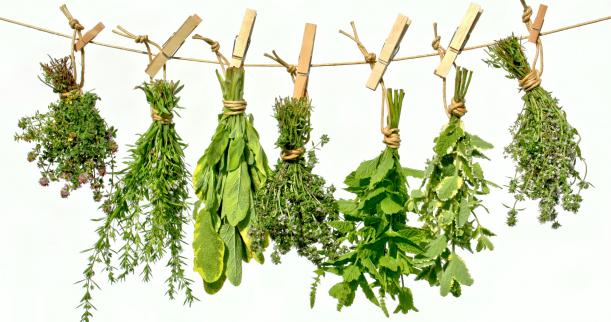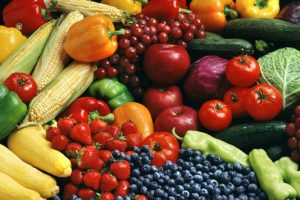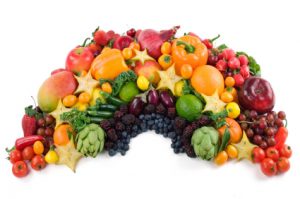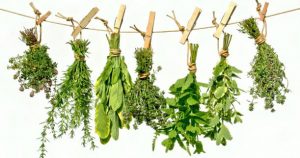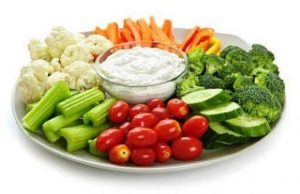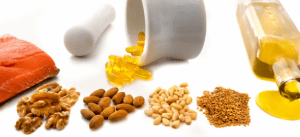Inflammation is a problem for many of us these days in one form or another. Anything from a skin rash to rhinitis to arthritis can be put down to inflammation of some sort in the body. And that is where it starts, that is the body’s way of letting us know that all is not well. Years of inflammation can then result in conditions such as heart disease, stroke, cancer and autoimmune diseases like Multiple Sclerosis, Lupus, Rheumatoid Arthritis. Let’s take a look at some guidelines for eating to reduce inflammation.
And maybe you are feeling ‘perfectly fine’? But in the age, we live in, with all the refined foods on offer these days, there’s no doubt that in all our bodies there are many things going on, like inflammation, free radicals, oxidative damage, all going to do you harm over time. All of these are now being implicated in illnesses and disorders such as cancer, Alzheimers, Dementia, MS, Lupus, the list goes on. And the food you are eating may be contributing to this or making it worse, or may even be causing your ailments if you have some.
Focusing on ‘what not to eat’ can be difficult and can easily put you into a mind frame of ‘wanting what you can’t have’, so what I am talking about here is focusing on the foods to eat more of! Foods with anti-inflammatory and antioxidative properties, that are going to reduce all the things mentioned above. A good varied whole foods diet, free of refined foods, sugar, gluten & dairy is going to be optimal for reducing inflammation in the body. Read on for our top practical tips on making your diet as anti-inflammatory and anti-oxidant as possible!
Eating to Reduce Inflammation
Fruit & Vegetables
Studies have shown that people who eat fruit & veg are less likely to get diseases like cancer, heart disease and stroke. Both are so versatile, they are fantastic, so many different types, so many different tastes and textures. There are endless things you can do with them. When you think of fruit & veg think how and where can I fit more of it into my diet? It’s like crowding out, the more of the these you are eating the less room there will be in your diet for the bad stuff!
Colour
This is a simple rule of thumb to follow, make your diet as colourful as possible. Try to eat a rainbow every day! Brighter colours are going to have more anti-inflammatories and anti-oxidants. Green, red, blue, purple, orange, yellow and white, include a good variety of them every day! Things like salads and stir-fries are a great way to fit in loads of colour into a dish.
Herbs
Herbs are well documented for their health benefits. We all know green is good, and these guys have the brightest green colours. Growing your own herbs at home is a great way to make sure you have them there when you need them every day. They can be added to soup, salad, sauces, dishes, anything and they are going to bring the anti-inflammatory properties of that meal right up!! Parsley, thyme, dill, coriander, rosemary, basil, mint, any of them are all going to be grown really easily in a little pot in your kitchen or in your garden. You will find them readily available at your local garden centre.
Spices
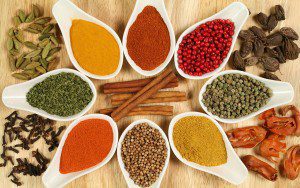
You have to only look at the colour of spices, like turmeric, curry, chilli to see that they are good, they are bursting with anti-inflammatories and antioxidants. Spices can so easily be used, just by shaking on meat or veg, in curries, chillies and many other dishes. There are great spice companies out there now, making cooking with spices not so daunting anymore. Check out www.greensaffron.ie for amazing spice blends and curry mixes, that make cooking with spices a whole lot easier!
Raw
Eating fruit and veg is great but it raw is going to be even better as all the beneficial enzymes and nutrients are going to be intact, not damaged by cooking. Also, the more chewing involved in eating raw fruit & veg is going to mean better digestion and gut health, which ultimately is going to help in its own way against inflammation, free radicals, oxidative stress… Salads are a fab way to include lots of raw veg into a meal, or even in a stir-fry add some veg in at the end, rather than during cooking or just simple crudites.
Omegas
We know that we need omegas 3 & 6, but did you know what is more important is having the right balance of the two? Having more of one than the other can actually be counterproductive as they compete against each other in the body. Taking a good combination supplement with the right quantities of both is a great way to ensure this. It’s good to note if taking something like evening primrose oil (omega 6) you need to make sure you are getting enough fish oil, or some other omega 3 also.
So in with the good and out with the bad and goodbye to inflammation! 🙂
By Kara Reilly (www.fooducation.ie)
